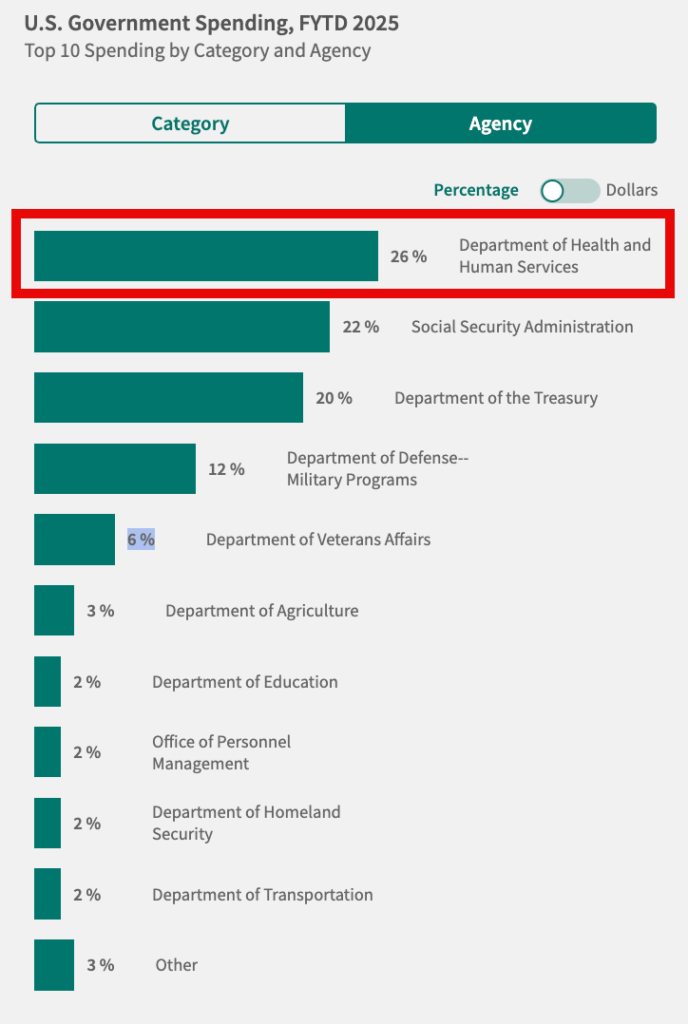
As the graph at right shows, the biggest part of the US budget is Health & Human Services. And five weeks ago they announced they’ll reduce public participation in their spending decisions: what they support and what they cut off.
This is a desperate mistake for the public’s interest, and thus for patients, because it’s now much easier for the agency to publish rules that the public might hate. Watch out. They promised a “new era of radical transparency” but this is the opposite. That’s fraud in the Senate confirmation process, and for your healthcare that’s not good.
It’s too late to stop it – it’s fait accompli now, because there was no advance notice. But we can be informed, we can yell at horrible decisions, and when necessary we can sue.
The sudden change (without notice) illustrates my point: if the people in charge literally won’t listen to the public, they get to disregard what the public wants. Again: for your healthcare, that’s not good.
Our access that’s now being limited:
Forbes staff writer Joshua Cohen has an excellent article about the change this month. He notes that since 1971 “anyone could view HHS’s notices [of proposed rules] and give input” and that “healthcare providers and patient groups have frequently taken the opportunity.” That’s included me, sometimes: as regular readers know, such advocacy has been part of my work for 15 years. And people I’ve known at HHS have said patient voices were a big part of the reason you and I have access to our medical records today.
Case in point: OpenNotes
Famed patient advocate Liz Salmi now works at OpenNotes. She has a powerful new essay about this in The BMJ, calling the change a threat to science and public health, with co-authors from the OpenNotes team: scion Tom Delbanco, Jan Walker, Cait DesRoches. They correctly call public input on rules…
a critical mechanism that invites patients, care partners, healthcare professionals, and advocacy organisations to weigh in on policies that directly affect them. Removing the formal mechanism for public comment would set a dangerous precedent by permitting policies to be formulated unilaterally behind closed doors.
It’s exquisitely important to realize that OpenNotes is evidence-based, which made it far easier for doctors to accept – and that’s because additional research grants proved the benefits. As Liz and team write:
These studies showed that patients felt more informed, reported better adherence to treatment plans, and were able to identify medical errors before harms occurred.
Grants for such research are important for the policy improvements that make our care better. Remember: in the early days, the industry doubted that we wanted to see our records. Grants and public input are what gave us what we have: care that’s more patient-centered.
Examples of potential harm to watch for
The fine print of HHS’s change is nerdy (“Richardson Waiver,” “APA”) but the big picture isn’t: this change affects rules for “grants, benefits, or contracts.” That’s just about everything that HHS spends money on:
- Grants: the projects HHS gives money to, like the ones I just mentioned. HHS will now be freer to make up rules about who will and won’t be able to apply for, and get, Federal grants – for instance, all the medical research funded by NIH.
- Benefits: that’s Medicaid, among other things. Of particular concern is proposed rule changes to make poor and disabled people should work or volunteer to get this benefit. It’s always been an unpopular idea – including in Republican administrations – but now it will be easier to slip through.
- Contracts: for instance, a huge amount of the work in creating health data projects has been funded by HHS. (None has come to me, but I am talking about some good people I know, who have created software that brings you your patient records.)
Action you can take:
As I said above, we can be informed, we can yell about horrible decisions, and when necessary we can sue. A good, consumer-friendly article on the whole subject is from law firm Sidley: U.S. HHS Abruptly Withdraws Longstanding “Richardson Waiver” Requiring Notice and Comment for Public Benefit Rules


Leave a Reply